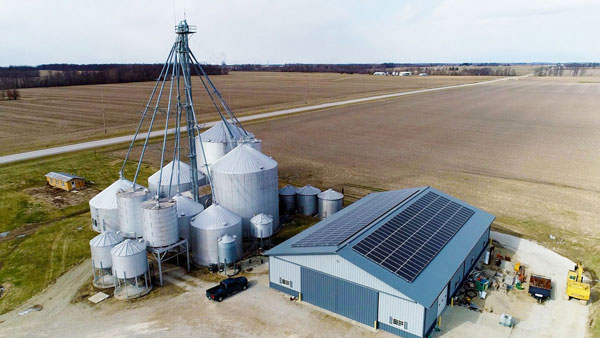
It’s harvest time, which means high electricity bills from grain drying and other farm operations. It’s also a good time to think about the benefits of solar for farmers.
Energy is a major expense for farms. Converting the sun’s bountiful energy is a great opportunity for farmers. Sunshine grows crops, let it power your farm too!
Here are the key factors farmers should think about when considering to install solar.
Grants & Incentives
Farmers can benefit from several state and federal solar incentives to significantly bring down the cost of installing solar.
- Federal Investment Tax Credit (ITC) of 30% (decreasing to 26% in 2020)
- Illinois Solar Renewable Energy Credits (SCRECs) can cover 20%-40% of install costs
- USDA Rural Energy for America Program (REAP) grants may be available in your area
- The Modified Accelerated Cost Recovery System (MACRS) system of accounting allows the depreciation of a solar investment over 5-years.
- Alternatively, Section 179 or other creative depreciation methods might exist, which you should discuss with your tax adviser.
Intense Energy Needs
Farming takes a lot of hard work, and it also take a lot of energy to accomplish. What kind of energy needs do farms have?
- For grain farmers, drying the harvest takes a lot of energy. Maintaining moisture levels is vital and can’t be avoided.
- Livestock barns require proper ventilation, cooling, heating, and lighting. These needs are energy-intensive and cannot be allowed to fail.
- Farmers also rely on a multitude of electrical equipment. This equipment requires a lot of energy and needs to be ready at a moment’s notice.
Less Profitable Land
Sometimes farmers don’t have the appropriate or adequate rooftop to install solar and are left to consider ground-mounted solar. But this raises a question: Is it worth taking up valuable land to install solar? Frequently, the answer is yes.
Some farmers may be concerned about giving up land for solar, but the dollars per acre value of solar can be much greater than he value generated by corn and soybeans. Commodity prices rise and fall, while the price of electricity consistently increases. Added up over the years, the cost of energy adds up quickly and could more than make up the loss in potential crop revenue.
Additionally, for many farms, the land required for their solar panels is less than farmers might expect. Working with a solar expert like Tick Tock Energy, farmers can plan out a minimal area to generate a significant portion of their energy needs.
Grazing Sheep & Solar Cohabitation
Grazing animals such as sheep can actually be beneficial for solar installations. Allowing sheep to graze around solar panels can keep grass and weeds at bay, controlling pesky undergrowth beneath the panels. Innovative farmers can put sheep to work eliminating potential landscape costs, reduce their energy usage, and raise livestock all at once.
These are just a handful of the benefits farmers can expect from installing solar. To learn more, contact us today!


